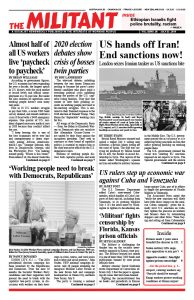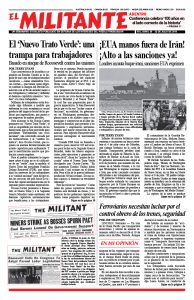The U.S. Treasury Department added Cuba’s state-owned Cuba-metales, which handles all Cuba’s imports of fuels and oil, including from Venezuela, to its growing blacklist July 3. It’s the latest move by Washington to tighten its decadeslong embargo against Cuba, part of its efforts to topple the government of Nicolás Maduro in Venezuela.
The Associated Press noted that “while the new sanctions will likely have little direct impact on the state-run Cuban company,” given the already strict U.S. sanctions on Cuba, they tighten the pressure on workers and farmers there by intimidating shippers and other firms “from buying and selling oil from Cubametales out of fear of drawing Treasury’s ire.”
AP pointed to the example of Italy’s PB Tankers, blacklisted in April for transporting petroleum products from Venezuela to Cuba. When they slapped the new sanctions on Cubametales, U.S. authorities removed PB Tankers from their blacklist, saying it had broken off all relations with the Cuban export-import company.
There are more than 200 Cuban companies, ministries, hotels and other businesses on the U.S. blacklist, which face strict sanctions by Washington.
“Maduro is clinging to Cuba to stay in power, buying military and intelligence operatives in exchange for oil,” Treasury Secretary Steven Mnuchin claimed July 3. This is the same lie that Washington has peddled for years, falsely claiming that the more than 20,000 Cuban internationalist volunteer doctors, nurses and teachers in Venezuela are in fact soldiers and spies.
The initial contract for oil between Cuba and Venezuela was signed Oct. 30, 2000, for “53,000 barrels per day for a five-year period” to Cuba amounting to “33 percent of the country’s consumption,” Granma noted in 2002.
While the oil is sold at lower than the world market price, the Cuban government has paid millions of dollars for it, Granma said. “For our part, we have not spared any effort, sacrifice, and expense to cooperate with that sister nation and we will continue doing so,” Granma said, including with Cuban volunteer medical workers.
Sanctions hit Petrocaribe countries
In 2005 Venezuela initiated the Petrocaribe program. It grew to sell oil to some 18 Caribbean and Latin American nations with favorable prices and payment terms. But with the precipitous drop of Venezuelan oil production over the last several years, caused by a growing social and economic crisis in the country, combined with the impact of the U.S. sanctions, those nations have received almost no oil in months.
Haiti, one of these countries, now can only provide electricity three hours a day in much of the country. Some hospitals run on backup generators and gasoline sells for as much as $12 a gallon on the black market. The U.S. rulers have done nothing to offer any aid.
The Treasury Department imposed sanctions on Venezuela’s state-owned oil company PDVSA in January aimed at preventing all crude oil exports, especially targeting Cuba. In April it placed full sanctions on 34 ships owned or operated by PDVSA, including a Greek tanker. A week later, Washington extended the sanctions to four shipping companies and nine oil tankers from Liberia and Italy.
Nonetheless, some shipping companies — seeing opportunities to make profits — are defying Washington’s violation of Venezuelan and Cuban sovereignty. Washington hopes that the new measure will bring more of them to heel.
In a speech to the Cuba’s National Assembly April 10, Raúl Castro, first secretary of the Communist Party of Cuba, said revolutionary Cuba will remain resolute in the face of the U.S. squeeze.
“We will never abandon the duty to act in solidarity with Venezuela. We have told the North American administration with the greatest clarity, firmness and serenity, through direct diplomatic channels and publicly, that Cuba does not fear the threats,” he said.
“It is in the interest of working people everywhere to oppose U.S. imperialism’s aggressive moves, which are aimed at punishing the workers and farmers of Venezuela and Cuba,” Anthony Dutrow, Socialist Workers Party candidate for Miami City Commission said July 9. “We call on Washington to keep its hands off Cuba and Venezuela, lift all its punishing sanctions, end U.S. imperialism’s economic warfare, and stop violating the sovereignty of those peoples.”

